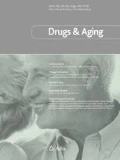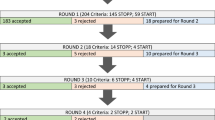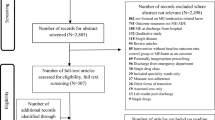Abstract
Background: Older people are at greater risk from polypharmacy and adverse effects due to interactions and altered pharmacokinetics. They may also have greater difficulty managing their medicines and complying with dosage regimens for various reasons.
Objective: To identify the types of medicine compliance issues that occur among older people.
Method: The study was undertaken in suburbs of the city of Auckland, New Zealand. A sample of 31 older people (≥65 years of age) living in the community consented to participate in the study. Semi-structured interviews and observation were used to determine how older people were managing their medicines. Observation of the interaction between the pharmacist and older person was performed to gather baseline information and semi-structured interviews were undertaken within 1 month to determine how older people were using their medicines and to identify compliance issues surrounding their use of medicines. Observation of the pharmacist-older person interaction was undertaken in the pharmacy where the older people usually collected their medicines, and participants were subsequently interviewed in their homes. The main outcome measure was compliance issues associated with the use of medicines.
Results: The main issues identified were alteration of labelled medicine instructions; transferring medicine into other containers and the associated labelling and safety issues; and patients not taking medicines for various reasons, including swallowing difficulties, expense, difficulty in opening packaging, confusion about the regimen and adverse effects experienced and personal reasons. There was an average of five compliance issues per participant.
Conclusion: This study identified intentional and non-intentional compliance issues that could hinder the optimal use of medicines by older people who are at greater risk of medicine-related adverse effects. Large quantities of medicines, confusion, and lack of knowledge as to why a medicine had been prescribed contributed to non-compliance. Appropriate communication between the pharmacist and patient, patient education and aids such as medication cards and referral for medication review could improve compliance in this age group.







Similar content being viewed by others
References
Health and independence report: Director-General’s annual report on the state of public health. Wellington: Ministry of Health, 2003
Health of older people in New Zealand: a statistical reference 2002. Wellington: Ministry of Health, 2002
Lowe CJ, Raynor DK. Intentional non-adherence in elderly patients: fact or fiction? Pharm J 2000; 265(7114): R19
Bryant L. Medicines issues in the older person. Pract Nurse 2004; 4(2): 9–10
Hattaway V. Medication compliance in the elderly. NZ Pharm 1996; 16(2): 36–7
Col N, Fanale JE, Kronholm P. The role of medication non-compliance and adverse drug reactions in hospitalizations of the elderly. Arch Intern Med 1990; 150: 841–5
Cox K, Stevenson F, Britten N, et al. A systematic review of communication between patients and healthcare professionals about medicine taking and prescribing [online]. Available from URL: http://www.medicines-partnership.org [Accessed 2004 May 31]
New Zealand pharmaceutical schedule. Wellington: Ministry of Health, 2005 Aug
Health Information Privacy Code 1994. Wellington: Office of the Privacy Commissioner, 1994
Ware GJ, Holford NHG, Davison JG, et al. Unit dose calendar packaging and elderly patient compliance. N Z Med J 1991; 104: 495–7
Mahony F. Seen but not heard: a process and outcome evaluation of the Integrated Services for Older People project [thesis]. Auckland: University of Auckland, 2002
Brummel-Smith K. Polypharmacy and the elderly patient. Arch Am Acad Orthop Surg 1998; 2(1): 39–44
Thompson S, Stewart K. Older persons’ opinions about, and sources of, prescription drug information. Int J Pharm Pract 2001; (9): 153–62
The dispensing guide. Wellington: Pharmaceutical Society of New Zealand, 2004
Corlett AJ. Caring for older people: aids to compliance with medication. BMJ 1996; 313: 926–9
Acknowledgements
The School of Pharmacy, University of Auckland, provided resources for this study. The investigators acknowledge the role of the pharmacists and older people who participated in this study. They also thank Helen Antypas, who assisted with preparation of the manuscript.
At the time of publication, none of the authors had any conflicts of interest of direct relevance to the content of this study.
Author information
Authors and Affiliations
Corresponding author
Rights and permissions
About this article
Cite this article
Kairuz, T., Bye, L., Birdsall, R. et al. Identifying Compliance Issues with Prescription Medicines among Older People. Drugs Aging 25, 153–162 (2008). https://doi.org/10.2165/00002512-200825020-00007
Published:
Issue Date:
DOI: https://doi.org/10.2165/00002512-200825020-00007




